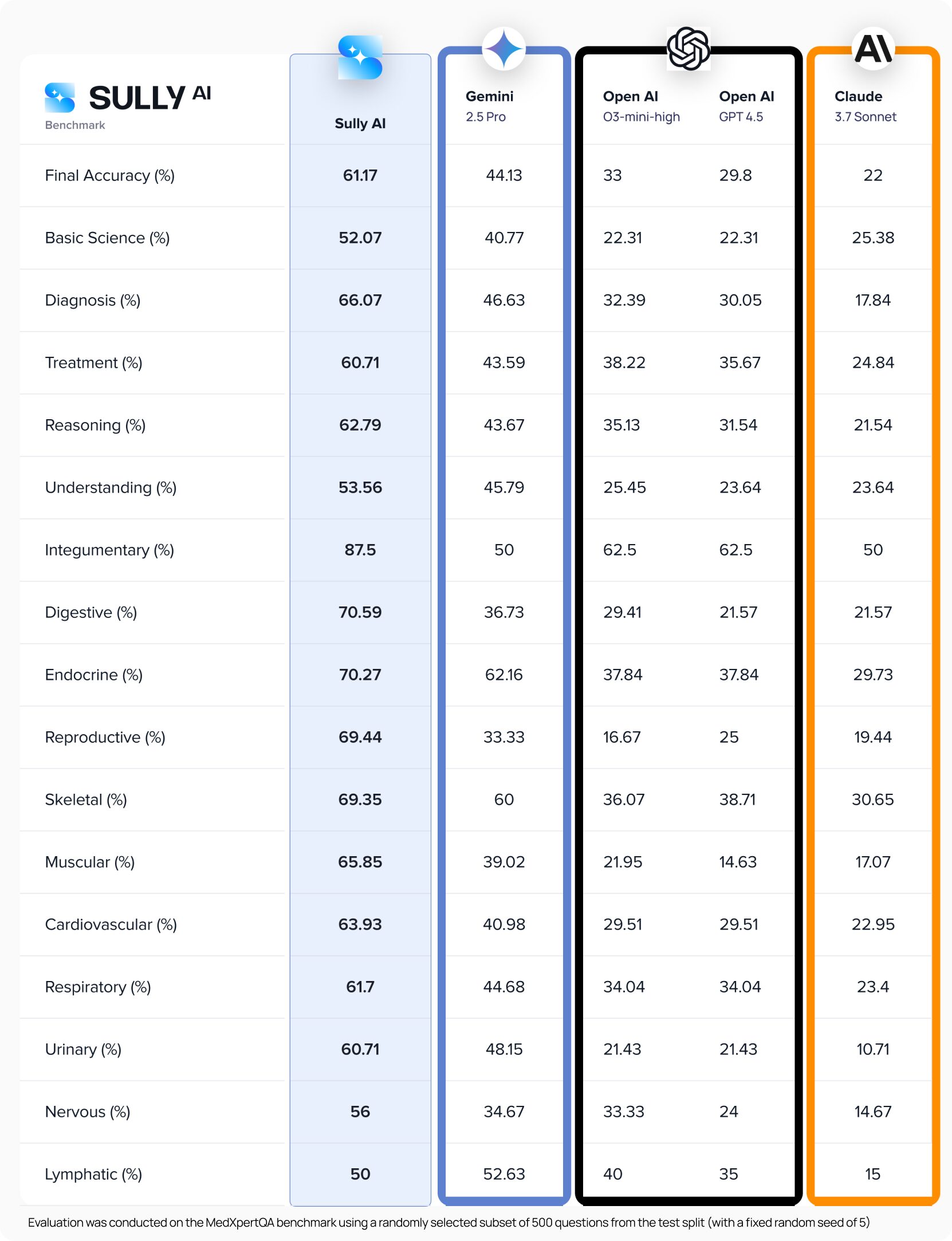Table of Contents
Overview
Sully.ai represents a significant advancement in AI-driven healthcare technology, utilizing a sophisticated ensemble approach that goes beyond traditional single-model AI solutions. The platform implements multiple specialized medical AI agents, each powered by individual large language models, to simulate the collaborative decision-making process found in real clinical environments. This innovative architecture enables more comprehensive and accurate medical assessments by combining the expertise of various AI specialists.
Key Features
Ensemble of Specialized Medical AI Agents: Deploys multiple expert AI models, each trained on specific medical domains, to provide comprehensive clinical analysis and decision support.
Consensus Mechanism Technology: Implements a three-stage pipeline including triage, expert response, and final aggregation to deliver robust medical recommendations.
Real-time Clinical Decision Support: Provides immediate, evidence-based insights to healthcare professionals during patient interactions and clinical workflows.
Modular Architecture for Scalability: Features flexible system design that enables integration of new AI agents and adaptation to specific healthcare specialties.
HIPAA-Compliant Infrastructure: Ensures all patient data processing meets healthcare privacy standards with end-to-end encryption and secure storage.
Multi-language Support: Offers clinical assistance in 19 languages to serve diverse patient populations globally.
How It Works
Sully.ai employs an innovative multi-agent approach where clinical queries are processed through a sophisticated pipeline. The system begins with a triage model that analyzes incoming medical information and determines which specialist AI agents should be consulted. Each expert agent independently evaluates the query from its specialty perspective, generating detailed assessments and probability distributions for potential diagnoses or treatment recommendations.
The system then uses a consensus mechanism to synthesize these expert opinions into a unified clinical recommendation. This approach mimics the collaborative process used in medical consultations, where multiple specialists contribute their expertise to reach the most accurate diagnosis or treatment plan.
Use Cases
Emergency Department Triage: Rapidly assesses patient conditions to prioritize critical cases and optimize emergency room workflows.
Clinical Decision Support: Provides healthcare professionals with evidence-based recommendations during patient consultations and treatment planning.
Telemedicine Enhancement: Supports virtual care delivery by offering expert-level insights during remote patient interactions.
Medical Education Platform: Serves as an interactive learning tool for medical students and continuing professional development.
Clinical Research Support: Assists in patient screening for clinical trials and research studies based on complex medical criteria.
Pros \& Cons
Advantages
Multi-Agent Expertise: Leverages specialized AI models for different medical domains, providing more comprehensive and accurate assessments.
Collaborative Clinical Reasoning: Simulates the multi-disciplinary approach used in real medical practice, leading to more robust diagnostic conclusions.
Enhanced Accuracy and Reliability: Demonstrates superior performance with 61.2% accuracy on MedXpertQA benchmark, outperforming individual large language models.
Scalable Healthcare Integration: Designed for seamless adoption across various healthcare settings with existing IT infrastructure compatibility.
Transparent Decision Pathways: Provides clear explanations of how clinical recommendations are reached, supporting clinician confidence and patient trust.
Disadvantages
High Computational Requirements: Operating multiple AI agents simultaneously requires significant processing power and infrastructure resources.
Dependency on Data Quality: System accuracy relies heavily on the quality and comprehensiveness of training data across all medical specialties.
Ongoing Validation Needs: Requires continuous testing and validation across different medical fields and patient populations.
How Does It Compare?
In the evolving landscape of AI-powered healthcare platforms, Sully.ai distinguishes itself through its unique multi-agent consensus approach:
Infermedica: Utilizes advanced AI inference engines and machine learning algorithms for symptom analysis and medical triage. While highly effective for symptom checking with 93% diagnostic accuracy, it focuses primarily on single-agent symptom assessment rather than multi-specialist collaboration.
Hippocratic AI: Employs the Polaris constellation architecture featuring multiple large language models working cooperatively. Recently achieved unicorn status with \$141M Series B funding in 2025, focusing on non-diagnostic patient-facing tasks and healthcare workforce augmentation through AI agents.
Glass AI: Offers an advanced LLM-based clinical decision support platform that has evolved significantly, launching Glass AI 2.0 in 2025. Provides differential diagnosis and clinical planning capabilities, though with a more traditional single-model approach compared to Sully.ai’s ensemble methodology.
Microsoft MAI-DxO: Recently announced in 2025, this diagnostic orchestrator achieved 85.5% accuracy on complex medical cases, surpassing human physicians. However, it focuses on diagnostic accuracy rather than the collaborative, multi-specialty approach that defines Sully.ai.
Final Thoughts
Sully.ai represents a paradigm shift in healthcare AI by successfully implementing a multi-agent collaborative approach that mirrors real-world medical practice. The platform’s Consensus Mechanism technology, demonstrated through superior performance on medical benchmarks, offers healthcare professionals a more comprehensive and reliable AI assistant. With over 400 healthcare organizations already utilizing the platform, Sully.ai is positioned to play a crucial role in advancing AI-assisted healthcare delivery.
As the healthcare AI landscape continues to evolve rapidly in 2025, with new competitors and technologies emerging regularly, Sully.ai’s focus on collaborative intelligence and transparent decision-making processes provides a strong foundation for continued growth and adoption in clinical settings. The platform’s ability to integrate multiple expert perspectives while maintaining high accuracy standards makes it a valuable tool for healthcare professionals seeking to enhance patient care through artificial intelligence.
